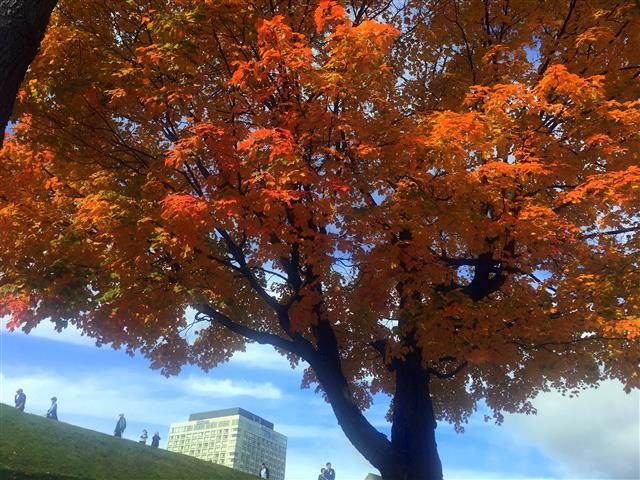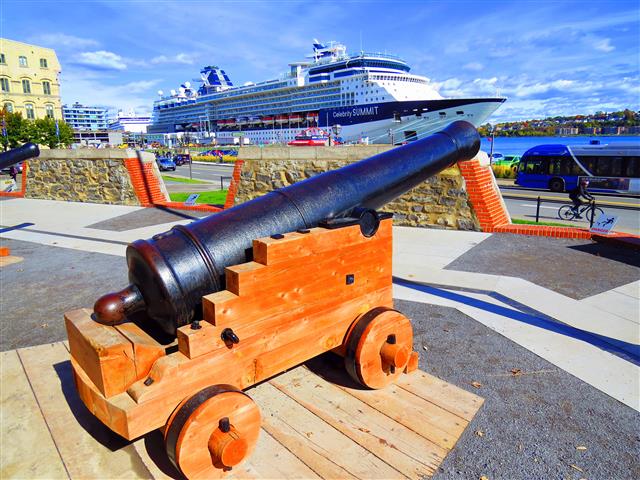Day 1 & Day 2 (9/28/16 – 9/29/16)
At 8:30 pm David from D & D Limo Services showed at our
door and we drove to LAX for our upcoming Virgin American flight to New York
City.
We arrived at JFK at 8:00 in the morning and used Carmel Car
Services to take us to the city and to the Double Tree by Sheraton hotel, in
Midtown Manhattan, a couple of blocks from 7th Avenue and Time Square. The traffic coming into the city was horrible and we arrived
at around 11:00 (2.5 hours!).



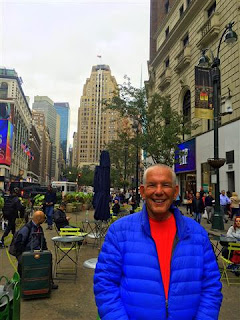




After checking in we walked towards 7th Avenue and
stopped for coffee at Starbucks and then had lunch at 5 Guys Burgers.
Walking became difficult for me as pain developed in my left
leg. I needed to stop every once in a
while to rest the leg. We decided to
walk to Korea town and look for a massage place. We managed to find one and the lady worked an
hour just on my upper leg but it did not help.
As pain increased, we decided to return to the hotel and
rest.
We talked to Donna & Russ and decided to meet tomorrow
for a visit at AMNH (American Museum of Natural History).
We had dinner we had at a great Chinese place on the corner of 8th
Avenue and 36th Street by the name of Chef Yu. It was DELICIOUS!
We went to sleep at 7:30 as the pain increased and we were
exhausted. I took a pain killer.
Day 3 (9/30/16)
Manhattan
We woke up after 12 hours of sleep (!) and I was delighted as
the pain on my leg eased.
Breakfast at Starbucks and then used the subway to arrive to
the museum, at the upper west side of the city.
As we arrived, we were greeted by rain.
We ran between the drops and arrived to the museum.
We met Donna & Russ at the American Museum of Natural
History Museum (AMNH). Donna already
booked a tour provided by Museum Hack , a New York base company, which
provides tours in the Big Apple. Our
tour guide was Kelly and she was awesome.

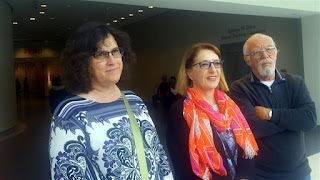




Kelly started by telling us a bit of history: The museum is
one of the largest museums in the world!! Located in park-like grounds across
the street from Central Park, the museum complex comprises 28 interconnected
buildings housing 45 permanent exhibition halls, in addition to a planetarium
and a library.





The museum collections contain over 33 million (!) specimens of plants, animals, fossils, minerals, rocks, meteorites, human remains, and human cultural artifacts, of which only a small fraction can be displayed at any given time, and occupies more than 2,000,000 (!) square feet.
The museum has a full-time scientific staff of 225, sponsors, over 120 special field expeditions each year, and averages about 5 million visits annually (!)








The museum collections contain over 33 million (!) specimens of plants, animals, fossils, minerals, rocks, meteorites, human remains, and human cultural artifacts, of which only a small fraction can be displayed at any given time, and occupies more than 2,000,000 (!) square feet.
The museum has a full-time scientific staff of 225, sponsors, over 120 special field expeditions each year, and averages about 5 million visits annually (!)



We started our tour at the Mammal Halls. I was extremely impressed as we passed the
halls. We visited the following: Bernard
Family Hall of North American Mammals, Akeley Hall of African Mammals, Hall of
Asian Mammals, Hall of New York State Mammals, Hall of Primates and Hall of
Small Mammals.
We continued to the Milstein Family Hall of Ocean Life, which highlights the drama of the undersea world and its diverse and complex web of
life in a fully immersive marine environment.

The hall is home to one of the Museum’s most celebrated displays—a 94-foot-long, 21,000-pound model of a blue whale suspended from the ceiling. Kelly commented on the whale display: “The fiberglass model of the female blue whale is a Museum treasure.
Blue whales have been hunted to near extinction. The Museum's blue whale serves as a reminder of our responsibility to our environment, both on land and in the sea. This is a model of a blue whale found in 1925 off the southern tip of South America. The largest animal alive today, this mammal species is fast, traveling up to 30 miles an hour. Blue whales are also loud; their deep sounds heard 620 miles away. They maintain their weight (sometimes more than 100 tons) on a diet of small crustaceans called krill.”
===========================================================================================================================================================================================================================================



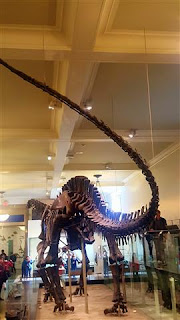



The hall is home to one of the Museum’s most celebrated displays—a 94-foot-long, 21,000-pound model of a blue whale suspended from the ceiling. Kelly commented on the whale display: “The fiberglass model of the female blue whale is a Museum treasure.
Blue whales have been hunted to near extinction. The Museum's blue whale serves as a reminder of our responsibility to our environment, both on land and in the sea. This is a model of a blue whale found in 1925 off the southern tip of South America. The largest animal alive today, this mammal species is fast, traveling up to 30 miles an hour. Blue whales are also loud; their deep sounds heard 620 miles away. They maintain their weight (sometimes more than 100 tons) on a diet of small crustaceans called krill.”
===========================================================================================================================================================================================================================================






We continued to the Fossil Halls to discover prehistoric
animals. These are the most famous halls
of the museum and the most talked about.
This is where you could find the famous dinosaurs. The Hall of Saurischian Dinosaurs displays
fossils from one of the two major groups of dinosaurs. Saurischians are
characterized by grasping hands, in which the thumb is offset from the other
fingers. This hall features the imposing mounts of Tyrannosaurus Rex and
Apatosaurus.
The tour lasted 2.5 hours and came to an end after the
Fossil Halls. The rain outside was
greeting us as it changed to heavy showers.






Tova & I decided to go to Katz Deli on Houston
Street. We took the subway to get there
and had the most delicious Pastrami sandwich plus a huge portion of French fries. We then took the F Train to Times Square and
walked the rest of the way to our hotel.



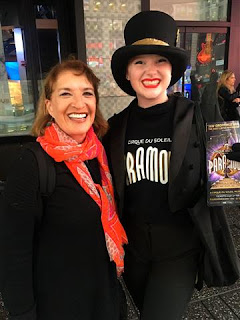




Day 4 (10/1/16)
Manhattan
We woke up at 8:00 and started singing: "Happy Birthday to
Noa", our new granddaughter turned one year old today!






We had breakfast at a local deli and it was yummy. I also woke up pain free. Good News!







We took the E train to Ground Zero. We intended to take a tour at the Freedom
Tower but when we arrived we were told that due to the low clouds, the
visibility is zero and the tour was cancelled.







We tour the grounds and once again were mesmerized to see
the displays at One World Trade Center.
It also brought the terrible memories of 9/11 and the tragedy. We visited WTC Memorial Pools and decided
to skip the visit the Memorial Museum, as the lines were a mile long. We then walked to the nearby WTC
Transportation Hub, which was completed recently. We found a fantastic structure with many
world famous stores and of course a beautiful subway station:
The “Oculus” serves as the centerpiece of the World Trade Center Transportation Hub, incorporating 78,000 square feet of multi level state-of-the-art retail and dining. The concourses emanating from the Oculus link the entirety of the site above and below grade. With an additional 290,000 square feet of exciting, multi-level retail and dining space, the World Trade Center site is the focal point of Lower Manhattan. The state-of-the-art Hub, completed in 2016, serves 250,000 daily commuters and millions of annual visitors from around the world. At approximately 800,000 square feet, the Hub, designed by internationally acclaimed architect Santiago Calatrava, is the third largest transportation center in New York City.
The “Oculus” serves as the centerpiece of the World Trade Center Transportation Hub, incorporating 78,000 square feet of multi level state-of-the-art retail and dining. The concourses emanating from the Oculus link the entirety of the site above and below grade. With an additional 290,000 square feet of exciting, multi-level retail and dining space, the World Trade Center site is the focal point of Lower Manhattan. The state-of-the-art Hub, completed in 2016, serves 250,000 daily commuters and millions of annual visitors from around the world. At approximately 800,000 square feet, the Hub, designed by internationally acclaimed architect Santiago Calatrava, is the third largest transportation center in New York City.
We walked to the waterfront just to see the Statue of
Liberty one more time and then took the E train to Spring Street, the
meeting point for our next adventure. We
arrived early and walked down the street and have lunch (hot dogs and coffee).
We met Renee, our new guide from www.freetoursbyfoot.com. This is how it works: You make a reservation
on their website and then receive an email where and when to meet your tour guide. The tours are for free and at the end you tip
the guide (Typically about $20 per person for a 3-4 hours tour).












We started our tour in SOHO. Renee told us the SOHO is the abbreviation of
South of Houston (the street not the city…).
A brief description followed:
SOHO is a neighborhood in Lower Manhattan, which in recent history came
to the public's attention for being the location of many artists' lofts and art
galleries, but is now better known for its variety of shops ranging from trendy
upscale boutiques to national and international chain store outlets.
We passed many streets going in and out of Spring Street and
finding many famous stores and boutiques.
We saw among other the landmark building that was completed in 1857: Haughwout
Building was typical of the period, with cast-iron facings in an
arcaded system with two orders of columns.
Renee told us that the building installed the world's first successful
passenger elevator in 1857, a hydraulic lift, which cost $300, had a
speed of .67 feet per second and was powered by a steam-engine installed in the
basement. Although the five-story structure was no taller than other buildings
of the time, and did not actually require an elevator, the inventor knew that
people would come to see the new novelty, and stay to buy merchandise...
Another landmark was Heath Ledger’s Apartment Buildings,
where the famous star found his tragic death.
The apartment was sold later for five million dollars!






We continued to Little Italy, once known for its large population of Italian Americans (mainly
from Sicily and Naples). Immigrants
from Naples and Sicily ventured to Little Italy in the 1880s, and the area
once stretched from Canal to Houston Streets, between Lafayette Street and the
Bowery.
The streets had many authentic restaurants, featuring pasta dishes and other delicious Italian dishes. The food is not the only draw. We saw some of the trendiest
clothing stores in the city on Mulberry Street, not to mention some
of the best bars in NYC.






One of the attractions was Lombardi, where the pizza is still baked in a coal oven at 500 degrees. (It is one of the only places in America, which still uses the coal oven).
Another attraction was seeing the restaurant that many scenes from “The Sopranos” were filmed at.
We walked on Mott Street and arrived to Chinatown, the home to the largest enclave of Chinese people in the Western Hemisphere with an estimated population of 90,000 to 100,000 people, Manhattan's Chinatown is also one of the oldest Chinese ethnic enclaves.
Our guide mentioned that a Chinese man, Ah Ken, is claimed to have arrived in the area during the 1840s; he is the first Chinese person credited as having permanently immigrated to Chinatown.


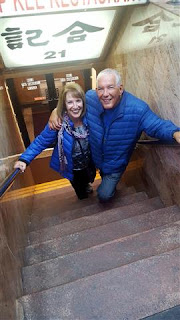
This was the last site with the tour. We thanked our tour guide and returned to Mott Street looking for a restaurant. We stopped first at a small kitchen on Moscow Street where they served fresh & hot dumplings.
We then walked on Canal Street and found the subway
station. We used the N train and were
back at the hotel at 8:00
Day 5 (10/2/16)
Cape Liberty, New Jersey
We woke up at 7:00 and after breakfast we started packing.
Carmel Limo showed up at 10 and we headed to Cape Liberty
and to our awaiting cruise ship, Celebrity Summit.
After a speedy checking in we found our cabin (number 1123,
11th deck aft).
We had lunch at Islands and then greeted Donna & Russ,
who arrived at around 2:00.




At 5:00 the ship started its journey, passing by the Island of Manhattan.




We unpacked and got ready for dinner at the Blu. Our waiter was Gabriel (from Romania). We also greeted Fernando, who was our wine
waiter on the Millennium (2015 cruise Vancouver to Shanghai). Our cocktail server was Victoria. The restaurant manager was Murgurel (also from Romania) and the hostess was
Jolanta.




After a delicious meal we went to the theater for the Welcome Show, featuring a multi talent singer & a musician (he played on the piano, harmonica, guitar and violin) by the name of Mark Donoghue and a vocal impressionist by the name of Karen Grainger. The show was hosted by the Cruise Director Chris.
We returned to our cabin at 11:00.
Before turning in, we moved the clocks one hour ahead.
Day 6 (10/3/16)
At Sea
Today was the Jewish New Year and after breakfast at
Islands, we joined services in one of the conference rooms where we met Rabbi
Jordan (from Palm Springs) for a short version of the services, which lasted merely one hour (!)
I later went to the theater, where the Excursion Manager
gave a lecture of what to do in Prince Edward’s Island and Quebec City, 2 of the port-of-calls we would visit later on.
We had lunch by the pool and then enjoyed the warm water at
the Thalassotherapy Pool plus a visit to the Jacuzzi and the sauna at the
Persian Garden.








We took a nap in the afternoon and then joined other Elite
members at the Revelations Bar. Dinner was
at the Blu and then we went to the theater to watch iHollywood, a visual &
musical feast of all our favorite movie moments and stars, presented by the
ship’s singers and dancers. We enjoyed it a lot.
We went to the ship’s mall on the 5th deck and
bought few perfumes, a leather wallet and some beauty supplies for Tova.
Back to our room at 11:00
Day 7 (10/4/16)
Halifax, Nova Scotia
We woke up at 7:00, as the ship was approaching Halifax. After breakfast at the Blu we exited the port, using a provided shuttle and looked for a taxi, which we found as soon as we got off the shuttle.
It was a beautiful day with lots of sunshine and warm temperatures.
We first visited St. Peter Church, the oldest
building in Halifax and the oldest existing Protestant place of worship in
Canada, founded by proclamation of King George II in 1749. We passed through Downtown but stopped only for some pictures taking.










Our next was the Halifax Citadel, named Fort George
(or Citadel Hill), named after King George II of Great Britain. The hill was first fortified in 1749, the
year the town of Halifax was founded, in order to defend the town from various enemies.
Great views of the city and the bay were awaiting us. Visibility was fantastic and my camera found
many angles of the city and the surrounding.


We then continued to the Titanic Graveyard, which is perhaps
best known as the final resting place for over one hundred victims of the
sinking of the RMS Titanic. The graveyard is also known as Fairview Lawn Cemetery.


DJ described what we were seeing: 121 victims of the sinking ship are interred here, more than any other cemetery in the
world.
Most of the people are memorialized with small gray granite markers with the name and date of death. Some families paid for larger markers with more inscriptions. The occupants of a third of the graves, however, have never been identified and their markers contain just the date of death and marker number. The city’s surveyor laid out three long lines of graves in gentle curves following the contours of the sloping site. By co-incidence, the curved shape suggests the outline of the bow of a ship. A complete listing of those victims buried in Fairview can be found here.
Most of the people are memorialized with small gray granite markers with the name and date of death. Some families paid for larger markers with more inscriptions. The occupants of a third of the graves, however, have never been identified and their markers contain just the date of death and marker number. The city’s surveyor laid out three long lines of graves in gentle curves following the contours of the sloping site. By co-incidence, the curved shape suggests the outline of the bow of a ship. A complete listing of those victims buried in Fairview can be found here.

One of the better-known Titanic markers is for an unidentified child victim, known for decades as The Unknown Child. No one claimed the body, so he was buried with funds provided by sailors of the cable ship that recovered his body. The marker bears the inscription 'Erected to the memory of an unknown child whose remains were recovered after the disaster of the "Titanic" April 15, 1912'.
After forensic testing, the unknown child was identified as 19-month-old Sidney Leslie Goodwin, an English child who perished with his entire family.
 A grave marked "J. Dawson" gained fame
following the release of the 1997 film Titanic, since the name of Leonardo
DiCaprio's character in the film is Jack Dawson. Many filmgoers, moved by the
story, left flowers and ticket stubs at Dawson's grave when the film was first
released, and flowers continue to be left today.
A grave marked "J. Dawson" gained fame
following the release of the 1997 film Titanic, since the name of Leonardo
DiCaprio's character in the film is Jack Dawson. Many filmgoers, moved by the
story, left flowers and ticket stubs at Dawson's grave when the film was first
released, and flowers continue to be left today.
The Fairview Titanic graves also include the burial place
and marker of William Denton Cox, a heroic steward who died while
escorting third class passengers to the lifeboats.
Twenty-nine other Titanic victims are buried elsewhere in Halifax; nineteen in the Roman Catholic Mount Olivet Cemetery and ten in the Jewish Baron de Hirsch Cemetery.
===========================================================================================================================================================================================================================================









After a 45 minute ride (about 30 miles) we arrived, for a
short stop, at West Dover, a coastal fishing community created in 1770.
Our next stop was the main event of the day: Peggy’s Cove,
which is famous for the Peggy’s Point Lighthouse (established 1868).
 DJ drove us to the top of a hill and then left to find a
parking spot while we were touring the most beautiful lighthouse I have ever
seen. The lighthouse is an iconic Canadian image. It is one of the busiest
tourist attractions in the province and is a prime attraction on the Lighthouse
Trail scenic drive. The lighthouse marks the eastern entrance of St. Margaret’s
Bay.
DJ drove us to the top of a hill and then left to find a
parking spot while we were touring the most beautiful lighthouse I have ever
seen. The lighthouse is an iconic Canadian image. It is one of the busiest
tourist attractions in the province and is a prime attraction on the Lighthouse
Trail scenic drive. The lighthouse marks the eastern entrance of St. Margaret’s
Bay.===========================================================================================================================================================================================================================================










The classic red-and-white lighthouse is still operated by
the Canadian Coast Guard, and is situated on an extensive granite outcrop at
Peggy’s Point, immediately south of the village and its cove. The lighthouse
is one of the most-photographed structures in Atlantic Canada and one of the
most recognizable lighthouses in the world.
We toured around the lighthouse. I went down to the edge of the granite hill
and the views from there were paradise to my eyes (and my camera).
We then went down the hill to the village. Peggy’s Cove comprises one of the numerous small fishing communities located around the perimeter of the Peninsula.



What we saw, while walking towards the heart of the village we saw picturesque and typically East-Coast houses perched along a narrow inlet and on wave-washed boulders facing the Atlantic.
Once we saw DJ and his car, I asked him why the place is called Peggy’s Cove. Here is what he had told me: There are many stories and legends why the place is called “Peggy’s Cove”. The popular legend claims that the name came from the sole survivor of a shipwreck at Halibut Rock near the cove. She was a little girl too young to remember her name and the family who adopted her called her Peggy, who later on married a resident of the cove in 1800 and became known as "Peggy of the Cove" attracting visitors from around the bay who eventually named the village, Peggy's Cove, after her nickname.
===========================================================================================================================================================================================================================================



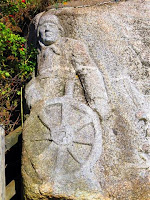
I visited the mural of Peggy's Cove, created by William deGarthe. The mural has 32 fishermen and their wives and children enveloped by the wings of the guardian angel St. Elmo. It also features the image of Peggy, whom deGarthe was obsessed with!
We left the cove with so many fond memories. We asked DJ to take us to a local lobster eatery: “Take us to where you and your friends go for a lobster”.
DJ knew exactly where to take us, but before arriving there we passed the Memorial for Swiss Air flight 111, a scheduled international passenger flight from New York City to Geneva, Switzerland. On September 2nd, 1998, the MD-11 performing this flight crashed into the Atlantic Ocean at the entrance to St. Margaret’s Bay. The crash site was 5 miles from shore, not far from Peggy’s Cove. All 229 passengers and crew aboard the MD-11 died.






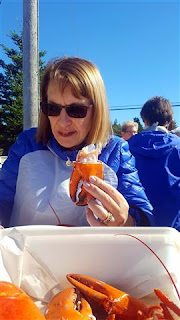

The name of the lobster eatery was Ryers Retail Lobster. The place was a bare bones place: A picnic
table, a bib, and a really great lobster. That’s it. $15 per person
for a 1.5 pound meal. Certainly, I had
planned our entire trip around culinary experiences, but hadn’t thought this
little place would include something this special. We attacked the lobsters like we haven’t
eaten for a week!!!
===========================================================================================================================================================================================================================================



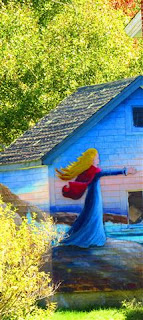
Our next stop was a surprising one, as we never expected
it. DJ took us to view Ivan Fraser’s “Peggy
of the Cove” museum. Ivan Fraser, who was cleaning the front of the museum, as we arrived, wrote a book by this title and built a museum for Peggy.
===========================================================================================================================================================================================================================================




We continued towards Halifax, passing through beautiful
forests. It was autumn and the leaves
were turning, changing to beautiful colors.








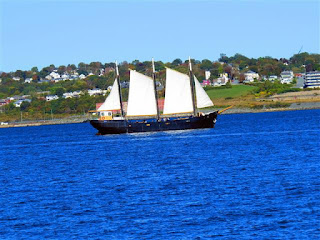









We made it to Halifax Seaport and this was
where we said goodbyes to our wonderful guide.
We then strolled slowly towards the cruise’s terminal, enjoying the
beautiful sunshine and the unforgettable sights.
We were back on the ship at 3:00 and found out the Chief
Security Officer and his assistant are both Israelis: Yoni & Matan.
We spent the afternoon sipping latte on deck 10. We met Vito & Debra from South Carolina, Mary & Al from Florida and Jude & Jan from San Diego.
After dinner at the Blu we joined the Music Trivia at the Rendevouz Lounge, hosted by the Cruise Activities Host.
We were back in our cabin at 10:00, as I started to feel
pains in my left shoulder to the point that I couldn’t fall asleep. I took some pain killers and hoped for the
best.
Day 8 (10/5/16)
Sydney, Nova Scotia
We woke up at 8:00 and after breakfast at the Blu we waited
for our turn to sail to shore, using a tender.
Now, this is my 2nd least favorite thing to do while cruising
(the first one is packing…) but thanks to our Elite Status, we did not have to
wait for long.
We left the ship, without Russ, who decided to rest and read
on the ship, at around 10:30 and arrived to shore at around 11:00.
Sydney was founded in 1785 by the British; it was
incorporated as a city in 1904, and dissolved on 1 August 1995, when it was
amalgamated into the regional municipality. It served as the Cape Breton
Island colony's capital, until 1820, when the colony merged with Nova
Scotia and the capital moved to Halifax. A rapid population expansion occurred
just after the turn of the 20th century, when Sydney was home to one of North
America's main steel mills.


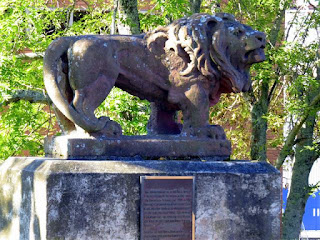





As soon as we reached the shore we saw the largest fiddle in
the world. Located at the Port, the iconic fiddle and bow reach 60
feet in height.

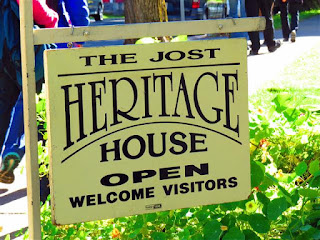










We walked to the Historic District, a short mile from the
port and saw some interesting homes, a beautiful church and a couple of
historic museums. We then reached
Charlotte Street, the main street in this tiny town. We stopped for a great latte accompanied with
a couple of cinnamon rolls.






On our way back to the ship we saw a wonderful decorated
Cadillac, owned by a local who was displaying his car for tips.
After dinner at the Blu we once again went to the Rendevouz
Lounge. The name of the game tonight was “One
Minute” where participants were asked to do an activity and finish in one
minute. Tova participated and won. She was asked to unroll a toilet paper.








The show tonight, at the ship’s theater, was great: We
watched Mark Donoghue once again. He
took the term “multi instrumentalist” into a new heights with his musical
journey.
We were in the cabin at 11:00
Day 9 (10/6/16)
Charlottetown, Prince Edward Island (P.E.I)
We arrived at 9:00 and after breakfast at Islands we met
with our guide, who I pre arranged with. His name Joe, from Prince Edward Tours.


















We drove through Charlottetown and arrived to a Mussel Farm,
where we saw a couple of boats picking up their trap, full with mussels. We then arrived to a village name Rusco
with an interesting church, St. Augustine, which was built in 1838. We found a great spot, looking to the delta
with many traps of lobsters surfacing on the water. We then continued to the harbor, where they
specialized in trapping lobsters.






Joe explained to us how it works: The traps (sometimes
called Pots) are large rigid objects which the lobster enters voluntarily,
often to reach bait, and which it then cannot escape, as they cannot swim
backwards.






In the village we found a pretty lighthouse, which is not in
operations and a famous home that has a unique feature: It can rotate 360
degrees, Joe told us that the house has
being rented all year around and has a 100 percent occupancy.











Joe took us to an unscheduled attraction called Glasgow
Hills, where we found homes around a golf course, over looking to the
ocean. What a pretty site.












It was time for lunch.
Joe already made reservations, a window’s table, at the Prince Edward
Island Preserve Company, in the city of Glasgow. When
we arrived, a line of people were waiting outside, in a queue, to get a seat. We were welcomed in and got a window's table,
overlooking at nature and the place's own garden.
The location of this place is an experience by itself with great views
all around. We ordered some fish, fish
cakes, seafood cake, chicken pot pie and seafood chowder. We left enough space
for the famous desert: Raspberry Cream Cheese Pie. It was absolutely a fabulous meal.
At the end of lunch we shopped for some goodies at the shop inside the restaurant.













We headed back to Charlottetown and visited St. Peter's
Cathedral, which was founded in 1869 as a result of the influence of the
Oxford Movement. Since that time, the
parish has remained Anglo-Catholic.

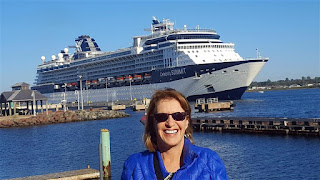

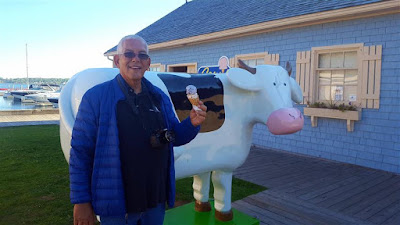






Joe dropped us off not far from the ship, as we wanted to
stroll for awhile.
We boarded the ship at around 5:00. At dinner tonight,
Gabriel showed us a magic trick. He was
amazing.
At the Rendevouz lounge I participated in the Yes/No
game. Chris, the host, asked many
questions and the trick was not to answer with a YES or a NO. Also, the contestant could not repeat a
substitute word more than 3 times and could not nod with his head. There were 2 winners that night. I was one of them. I received a nice Celebrity
T-shirt.
At the theater, we watched a magician named Stephen Williams, who
presented iMagic. A new technology that
is using the help of computers to make magic illusions. I like the old tradition better.
We were in our cabin at 11:00 and moved our clocks one hour
back before going to sleep.
Day 10 (10/7/16)
At Sea
We woke up at 9:00 and had a relaxing routine which included
eating, napping, eating again and enjoying the “day off” at sea.
Day 11 (10/8/16)
Quebec City
We woke up at 7:30 and open our curtains to watch the
beautiful skyline of Quebec, with the magnificent Chateau Frontenac
right there outside our balcony. The
weather however, was not cooperating.
The sky was covered with dark callous and rain was pouring.
We had breakfast at the Blu and then got off the ship at
10:00. We had no pre arranged tour for
the day but I was equipped with information of things I wanted us to do.
We managed to find a taxi driver, by the name of Nassir, who
had a minivan. We agreed on the itinerary and the price and started our day.
Our first stop was not far from the port. It was a marina, full with yachts and other boats. This is where the Old City ends and the New City starts, Nassir explained.


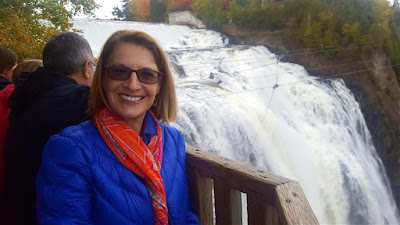
Our next stop was my highlight of the day. We arrived at the magnificent Montmorency
Falls, as the rain stopped and the sky cleared a bit. The falls were
located about 7.5 miles out of the city and located at the mouth of the Montmorency
River where it drops over the cliff shore into the Saint Lawrence River. Nassir indicated that the falls, at 84 meters
high and 46 meters wide, are 30 meters (roughly 100 ft) higher than Niagara
Falls!


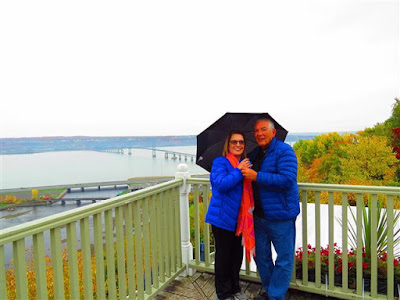



The waterfall itself was absolutely gorgeous. The mist got
quite intense at times right beside the falls. We stood there for quite some
time, marveling its beauty and the sheer force of the water as it endlessly
pummeled over the cliff. I took some beautiful pictures at the basin of the
falls and then we drove up to a parking lot not far from Montgomery Manor,
which was the summer residence of Prince Edward, Duke of Kent,
and the father of Queen Victoria. It was constructed in 1781. Nowadays,
it contains a restaurant with a lovely patio, and an interpretive center.

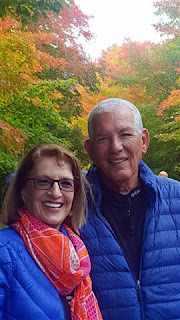









My neck and my back were acting up now. I really suffered from increasing pain.




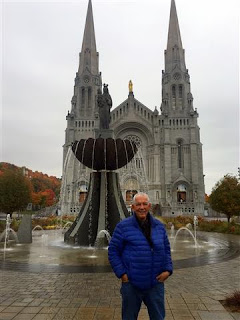







Nassir explained that St. Anne is believed, by the pious, to
obtain miracles through her intercession. People from all around the world come
to visit the basilica. Pillars in the front entrance are covered in crutches
from people who are said by the parishioners to have been miraculously cured
and saved. The basilica is called by many Church of Miracles.
Outside we saw a beautiful section of a forest where all
colors of autumn: red, brown, green and yellow were mixed in harmony on the
trees.
We drove to a place called Canyon Santa Anne, to
watch even more impressive colors of autumn.
The place is a spectacular, steep-sided gorge, carved by the
Sainte-Anne-du-Nord River.





We were back to the cabin at 10:00
Day 12 (10/9/16)
Quebec City
We woke up at 7:30 in Quebec City, as the ship had what it
is called “Overnight”.
After breakfast we got off the ship (without Russ) and took a taxi to a place called Plains of Abraham, where we were waiting for our walking tour to assemble.



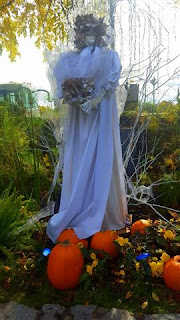


We started our tour at 10:00 and walked our way down to the
old city, visiting many attractions. The
influence of the pills started to take effect and I felt much better (smiley
Face).
The Battle of the Plains of Abraham, also known as
the Battle of Quebec, was a pivotal battle in the Seven Years' War (referred to
as the French and Indian War in the United States). The battle, which began on
September 13th, 1759, was fought by the British Army and Navy
against the French Army on the land where we stood on land that was originally owned by a farmer named Abraham Marti, (hence
the name of the battle).
The battle involved fewer than 10,000 troops between both sides, but proved to be a deciding moment in the conflict between France and Britain over the fate of New France, influencing the later creation of Canada. The climax of a three-month siege by the British, lasted about 15 minutes. British troops successfully resisted the column advance of French troops and Canadian militia, employing new tactics that proved extremely effective. In the wake of the battle, the French evacuated the city; their remaining military force in Canada and the rest of North America came under increasing pressure from British forces.


The battle involved fewer than 10,000 troops between both sides, but proved to be a deciding moment in the conflict between France and Britain over the fate of New France, influencing the later creation of Canada. The climax of a three-month siege by the British, lasted about 15 minutes. British troops successfully resisted the column advance of French troops and Canadian militia, employing new tactics that proved extremely effective. In the wake of the battle, the French evacuated the city; their remaining military force in Canada and the rest of North America came under increasing pressure from British forces.


In the garden, in front of us, they used to have pistol
duels between gentlemen, to settle arguments, protect honor, etc.
Part of the group (of 40 people) was a group of Israelis,
who live in the Bay Area. As we started
to talk to them, we found out that 2 of them (P’nina & Raffi) are good
friends with Liki & Itzik, who I have known almost all my life.
===========================================================================================================================================================================================================================================
We passed a statue of Charles De Gaulle, from France, who delivered in Montreal a controversial speech in 1967, during an official visit to Canada under the pretext of attending Expo 67. While giving an address to a large crowd from a balcony at Montreal City Hall, he uttered "Vive Montréal; Vive le Québec!" ("Long live Montreal, Long live Quebec!") and then added, followed by loud applause, "Vive le Québec libre!" ("Long live Free Quebec"). The phrase, a slogan used by Quebecers who favored Quebec sovereignty, and de Gaulle's use of it, was seen by them as giving his support to the movement.
===========================================================================================================================================================================================================================================
We passed a statue of Charles De Gaulle, from France, who delivered in Montreal a controversial speech in 1967, during an official visit to Canada under the pretext of attending Expo 67. While giving an address to a large crowd from a balcony at Montreal City Hall, he uttered "Vive Montréal; Vive le Québec!" ("Long live Montreal, Long live Quebec!") and then added, followed by loud applause, "Vive le Québec libre!" ("Long live Free Quebec"). The phrase, a slogan used by Quebecers who favored Quebec sovereignty, and de Gaulle's use of it, was seen by them as giving his support to the movement.
===========================================================================================================================================================================================================================================
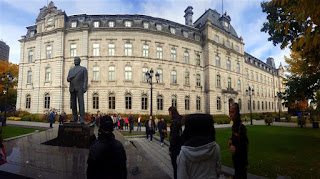


 The next main attraction was the 1886 Parliament House, a beautiful eight-floor building and home to the Parliament of Quebec.
The next main attraction was the 1886 Parliament House, a beautiful eight-floor building and home to the Parliament of Quebec.===========================================================================================================================================================================================================================================









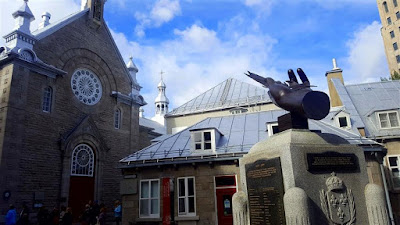






We walked in beautiful streets, crossing a park and the gate
to the city, passing statues of war leaders, colorful roof tops, beautiful
shops, boutiques, churches and the amazing Cathedral-Basilica of Notre-Dame
de Quebec.










We arrived to the magnificent Chateau Frontenac, a
castle like hotel and situated at a bank of St. Lawrence River.
The hotel is generally recognized as the most photographed
hotel in the world, largely for its prominence in the skyline of the city.
The hotel capacity is more than 600 rooms on 18 floors.
In front of the hotel there was an original and beautiful
statue by Salvador Dali: Alice Du Pais Merveilles (Alice in Wonderland).
===========================================================================================================================================================================================================================================
===========================================================================================================================================================================================================================================
We continued our walking tour and arrived to Place Royal,
a historical and archaeological site unique in Canada. Considered the
birthplace of French America, it played a major role in the social and economic
development of the French, and later English between the 17th and 19th
centuries.






Next to Place Royale we looked at a beautiful compilation of wall murals. Our tour guide explained that In the last 15 years, a number of fresco paintings have popped up across Quebec City, becoming a major component of the city's urban heritage. The murals, which depict the history of the city and its inhabitants, were commissioned between 1999 and 2008 to celebrate 400 years of the city’s existence. Although the pieces are fairly recent, they have nonetheless become part of the city's artistic and cultural heritage.
La Fresque des Québécois was the first mural to be completed in 1999. The huge mural pays homage to the history of Quebec City by depicting a number of its key figures, such as Samuel de Champlain (the French explorer and founder of Quebec).
This was also the end of our tour. We thanked our guide and went to a recommended restaurant to feast on the tradition dish: La poutine, made with French fries and cheese curds topped with light brown gravy.



We were back on the ship at 2:00 and took a nap. The ship started its way back to the USA,
passing close to the shores for a beautiful display of Autumn Colors.

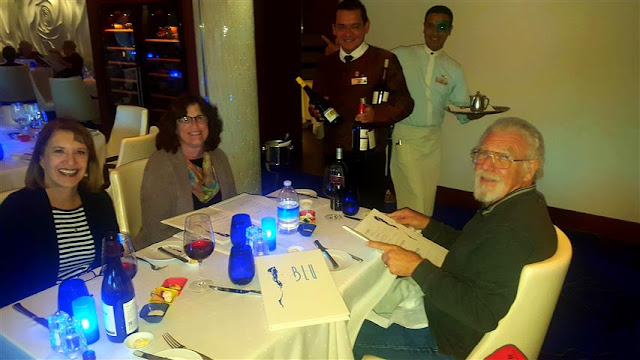


We had dinner at the Blu and then joined many of our “cruise
friends” to a game show at the Rendevouz Lounge, called Majority Rules.
We skipped tonight show at the theater, so we could watch
the 2nd debate between Hillary Clinton and Donald Trump.
Day 13 (10/10/16)
At Sea
We woke up at 9:00 and after breakfast went to relax at the
poolside.
Around lunch time there was an announcement by Captain Kate
that due to Hurricane Matthew we will miss our next port-of-call, Bar Harbor. The ship is going to slow
down, hoping to miss the storm, which was heading east. Instead we’ll be an extra day at sea.
When we woke up from our afternoon nap, we could already
fill the impact of the storm. The ship
was rocking and the sea was rough, with high waves for up to 15 feet and gusty
winds.
After dinner we joined once again to play a game called “Guests vs. Crew”, which was a trivia game. Guests won!!
The show tonight featured Natalie Toro, who was called “One
of the best contemporary artists of our time” by a Broadway magazine. The show was filled with beautiful songs from
Broadway shows. It was very entertaining.
My back pains returned and throughout the night I suffered
from extreme pains.
The sea became even tougher and things on our table, in the room, fell to the floor of the cabin, as the ship rolled from side to side.
Day 14 (10/11/16)
At Sea
We woke up at 10:00.
The pills I took last night helped a lot.
We had breakfast and pool and napping.
Tonight was Yom Kippur Eve, the holiest night for the Jewish people. We went to the “Synagogue” at 5:30, skipped dinner and went to the theater to watch a performer, by the name of Joel Mason, who impersonated, very successfully I may add, Elton John.
After the show I was introduced to a new technology called “Silence Disco”. The dancers were using headphone-sets that played 5-6 different disco music channels and each individual just danced to the rhythm he tuned into. It was weird to look at people dancing without any sound in the room.
We were back in the cabin at 11:00
Day 15 (10/12/16)
At Sea (instead of Bar Harbor)
We woke up at 8:00. My back and shoulder were better.
Sea was still very rough and gusty winds, rain and high
waves were the theme of the day.
Captain Kate announced that we are experiencing the tail end of the hurricane and by tomorrow we should expect a calm ocean and sunny skies.



Captain Kate announced that we are experiencing the tail end of the hurricane and by tomorrow we should expect a calm ocean and sunny skies.



Today’s highlights were: Breakfast, pool activities,
napping, dinner, game show, chocolate Extravaganza Buffet and the Love &
Marriage Game (which was VERY funny!)
We were back in the cabin at 11:00
Day 16 (10/13/16)
Portland, Maine
We woke up at 7:00.
The ocean was calm, the skies were blue and the ship was in Casco Bay, approaching the city of Portland, Maine, USA.


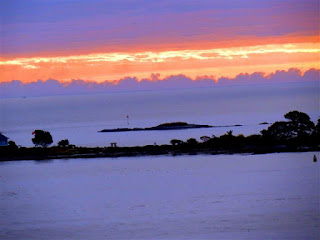



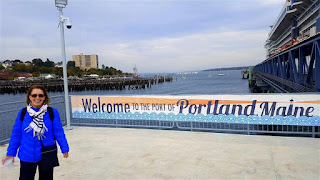











We had breakfast and then stood in line to go through the
immigration process. It went pretty
smooth and by 10:00 we already were on USA grounds, as we exited the ship.
Captain Kate greeted the passengers as they exited the ship, apologized for the rough weather we had in the last couple of days and even posed for pictures.



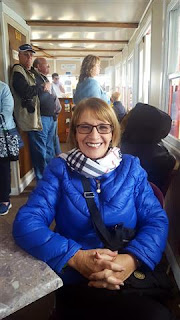


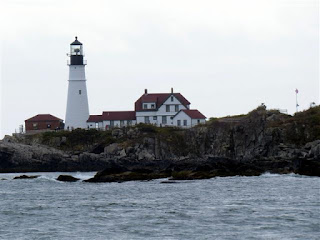







We walked for few minutes to find Portland Discover, the
company we booked with to tour the city. Our first excursion was a mini-cruise (only 90 minutes) to visit the
lighthouses around the city. The scenic cruise started and we left the busy Casco Bay
and its innermost islands to see lighthouses, forts, lobster boats, seals, and
seabirds. Four lighthouses could be seen including a close-up view of Maine’s
oldest and most photographed lighthouse, Portland Head Light, in Cape
Elizabeth.






It was a narrated cruise and the guide described and explained what we are seeing around!



Other attractions on the tour were: Portland Harbor Breakwater Light (Bug Light), Spring Point Ledge Light, and Ram Island Ledge Light.



We also passed some inhabited islands for the rich and famous.




 Upon our return to the dock we stood in a queue to start our new excursion the tour on land. We entered a trolley, which took us all around the
city. Our guide told us few facts about the
city: The largest city in Maine with about 70,000 people, who live in the city
itself and about 900,000 who live in the metropolitan area. One fascinating fact was as follows: Portland was
named for the English Isle of Portland, and the city of Portland, Oregon was in
turn named after Portland, Maine. (I did not know that!!!)
Upon our return to the dock we stood in a queue to start our new excursion the tour on land. We entered a trolley, which took us all around the
city. Our guide told us few facts about the
city: The largest city in Maine with about 70,000 people, who live in the city
itself and about 900,000 who live in the metropolitan area. One fascinating fact was as follows: Portland was
named for the English Isle of Portland, and the city of Portland, Oregon was in
turn named after Portland, Maine. (I did not know that!!!)===========================================================================================================================================================================================================================================



 We drove for awhile, all of us waiting for the moment that
we will arrive to Cape Elizabeth. The
highlight of the day!!!
We drove for awhile, all of us waiting for the moment that
we will arrive to Cape Elizabeth. The
highlight of the day!!!
We finally made it and it was AWESOME!
===========================================================================================================================================================================================================================================






The historic Portland Head Light sits on a head of land at the entrance of the primary shipping channel into Portland Harbor. Completed in 1791, it is the oldest lighthouse in the state of Maine. The light station is automated, and the tower, beacon, and foghorn are maintained by the United States Coast Guard.
It is the most photographed lighthouse in America and it was
so beautiful that for a moment I thought that I am looking at a picture on a
large screen theater.
We return to the city and decided to have chowder in one of the recommended places in the city: Gilberts Chowder House. It was a simple but excellent place to feast on the delicious chowder.
We return to the city and decided to have chowder in one of the recommended places in the city: Gilberts Chowder House. It was a simple but excellent place to feast on the delicious chowder.
We returned to the ship at 4:30.
===========================================================================================================================================================================================================================================

Tonight dinner was all about surf & turf. I had a lobster tail, dipped in butter and a tender steak. After dinner we participated in “Battle of the Sexes” game show and then went to the theater to see & listen to Soloman Jayewith with his presentation of ‘Heart of Music’, a tribute to Michael Jackson, Stevie Wonder, Sammy Davis Jr., and more.
===========================================================================================================================================================================================================================================
We were back in the cabin at 10:30
Day 17 (10/14/16)
Boston, MA
We woke up at 7:00 and after breakfast we exited the ship
for our last excursion of this journey.
 I made arrangements with our next tour guide – Freddy. I know this guy from other trips to the city
and he was a great choice. He greeted us
at the pier and we climbed his comfortable van.
I made arrangements with our next tour guide – Freddy. I know this guy from other trips to the city
and he was a great choice. He greeted us
at the pier and we climbed his comfortable van.
 I made arrangements with our next tour guide – Freddy. I know this guy from other trips to the city
and he was a great choice. He greeted us
at the pier and we climbed his comfortable van.
I made arrangements with our next tour guide – Freddy. I know this guy from other trips to the city
and he was a great choice. He greeted us
at the pier and we climbed his comfortable van.===========================================================================================================================================================================================================================================
We entered the church and listen to a guide, who was welcoming all the visitors. Built in 1723, Christ Church in the City of Boston, known to all as the Old North Church, is Boston’s oldest surviving church building and most visited historical site. It is a National Historic Landmark. The enduring fame of the Old North began on the evening of April 18, 1775, when the church sexton climbed the steeple and held high two lanterns as a signal from Paul Revere that the British were marching to Lexington and Concord by sea across the Charles River and not by land. This fateful event ignited the American Revolution.


We spent about 30 minutes there and then walked towards the
North End streets, passing by the statue of Paul Revere.


 We entered a café by the name of Vitoria. Established in 1929, Caffe Vittoria is world renowned as the first Italian caffe in Boston. We had a
nice cappuccino and tea and then met with Freddy, who was waiting for us in the
van. He took us to the house where
Secretary of State John Kerry lives. A
nice 3 story home in 19 Louisburg Square at the Beacon Hills neighborhood.
We entered a café by the name of Vitoria. Established in 1929, Caffe Vittoria is world renowned as the first Italian caffe in Boston. We had a
nice cappuccino and tea and then met with Freddy, who was waiting for us in the
van. He took us to the house where
Secretary of State John Kerry lives. A
nice 3 story home in 19 Louisburg Square at the Beacon Hills neighborhood.













































